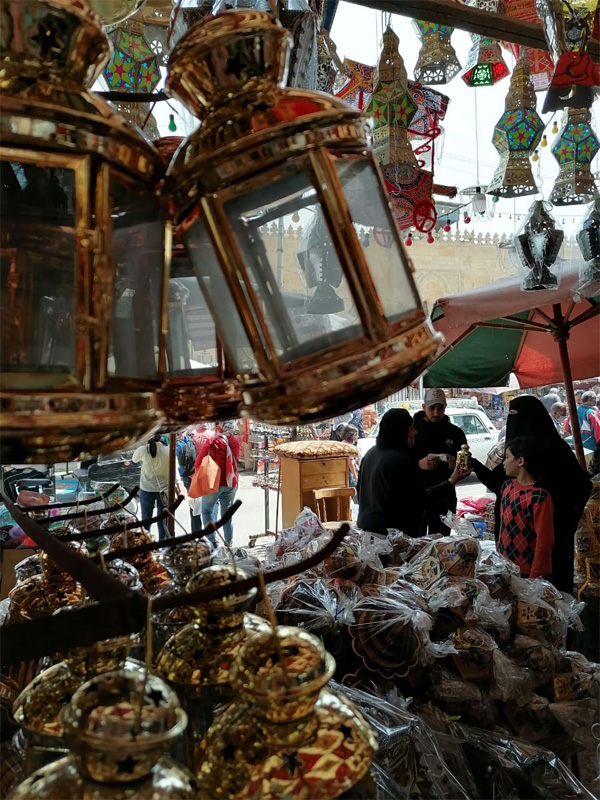After missing the joy of the festive and spiritual atmosphere of Ramadan last year due to restrictions imposed at the onset of the COVID-19 pandemic, Egyptians are on target this year to reclaim the brilliance of the holy month as the government eased some preventive measures on the month's traditional activities this time around.
In Ramadan 2020, the government allowed "Taraweeh" prayers only in some authorised mosques with a limited number of worshipers and banned it nationwide.
Egyptians had to abstain from traditional Ramadan gatherings and festivities as the first wave of the coronavirus hit the country.

Photo by amira noshokaty
This Ramadan around, the authorities allow in-mosque daily prayers and mass night prayers "Taraweeh" during Ramadan with the adoption of all the precautionary measures against COVID-19.
The Cabinet also decided to allow restaurants and cafes to remain open till 1am and shops till 11pm, allowing the public to venture out of their homes in search of Ramadan meals and drinks after a day of fasting.
Egyptians are already making early preparations for the month to be able to fast smoothly from dawn to dusk and have set aside time for its special worshipping traditions.
The joy of Ramadan starts when the Egyptian Grand Mufti announces the first day of the Holy month after the traditional sighting of the crescent in the evening.
A joyful feeling sets in as people wear new outfits to look their best and flock to mosques for 'Taraweeh' (special prayers), which are conducted in the evening after the 'Isha' (Night prayers). People break their fast with families at homes and organise outings with friends at coffee shops at night.
"I always wait for the announcement - by the Mufti - of Ramadan's start as it extends pleasure to my heart. I start preparations early for how I will spend the full month and where I will perform 'Taraweeh' prayers," Engineer Ahmed Mohamed told Ahram online.
Families stock up early on the food and drinks that they will need to consume during the month in order to save time for prayers and reading Qur'an as well as enjoy seasonal TV series and programmes.
Muslims will also be eating suhur, the meal consumed before fajr (dawn) prayers when Muslims start fasting, to avoid crankiness or weakness caused by the fast.
People traditionally eat Yogurt and rich fava beans to help them make it through the next day of fasting.
Mosques make special preparations to receive worshippers during the holy month, by cleaning praying carpets and increasing the number of indoor and outdoor lamps to boost lighing.
On the streets, residents and businesses hang colourful drapes, pennants and lanterns. Children play with the traditional 'fanous' (lantern) while chanting traditional Ramadan songs such as ‘Wahawi Ya Wahawi, Eyaha'.
A few weeks before the start of Ramadan, businesses begin selling colourful lanterns, tons of dates and 'Yamish', a combination of dried fruits and nuts usually mixed with milk or just plain, to be consumed when one breaks their fast.
Some Egyptians provide assorted packages comprising a variety of food and Yamish for those who cannot provide for themselves so they can also enjoy the month.
"We prepare food packages so that they are ready for sale as some people order 100 packages or more to distribute among those in need," said Mohamed Khater, an Owner of Food Depot in the Zaytoun neighbourhood in east Cairo.
"The packages represent a kind of
social solidarity between people. We have different kinds of packages for different uses," he added.
Coffee shops also roll out their best drinks for customers at night, including juice that rehydrates people who have abstained from food and water for more than 12 hours.
Most film makers stop their activities throughout the year as they only concentrate on producing TV series and programmes to be followed during the busy month of Ramadan.
"I can't wait for Ramadan's TV series as they always captivate my attention. I always pick one or two series to follow in Ramadan after breaking my fast," said Dina Ibrahim, a mother of two boys.
Homes and balconies are also decorated with colourful lanterns for the holy month. Life in Egypt changes during Ramadan as people concentrate on performing good deeds.
When the Maghrib prayer call starts at sunset, the streets are deserted as people sit down to break their fast.
However, after eating and drinking, streets and mosques start bustling with people.
The holy month of Ramadan starts astrologically on 13 April 2021, but the final word will be for the Egyptian Mufti after his sight of the crescent.
Another joy comes by the end of the month when the Grand Mufti announces final day of Ramadan and the first day of Shawwal that means the start of Eid Al-Fitr.
Short link: